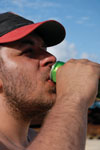 Energy drinks are consumed by 30% to 50% of adolescents and young adults. The manufacturers claim they are safe.
Energy drinks are consumed by 30% to 50% of adolescents and young adults. The manufacturers claim they are safe.
Researchers at the University of Miami, in Florida reviewed the evidence and came to a different conclusion.
First, the details.
- Two-thirds of the 121 references found on energy drinks were in the scientific literature.
- Reports by government agencies and interest groups also contained useful information.
And, the results.
- The drinks have reportedly been associated with serious adverse effects.
- People at risk
- Children
- Adolescents
- Young adults
- Adverse reactions
- Seizures
- Diabetes
- Heart abnormalities
- Mood and behavioral disorders
- People taking certain medications.
- People at risk
- Of the 5448 US caffeine overdoses reported in 2007, 46% occurred in those younger than 19 years.
The bottom line?
The authors concluded, “Energy drinks have no therapeutic benefit, and many ingredients are understudied and not regulated. The known and unknown pharmacology of agents included in such drinks, combined with reports of toxicity, raises concern for potentially serious adverse effects in association with energy-drink use.”
Energy drinks frequently contain high and unregulated amounts of caffeine. Other ingredients include guarana (which is basically caffeine), taurine, L-carnitine, ginseng, and yohimbine.
Several countries and states have debated or restricted sales and advertising.
2/22/11 21:02 JR